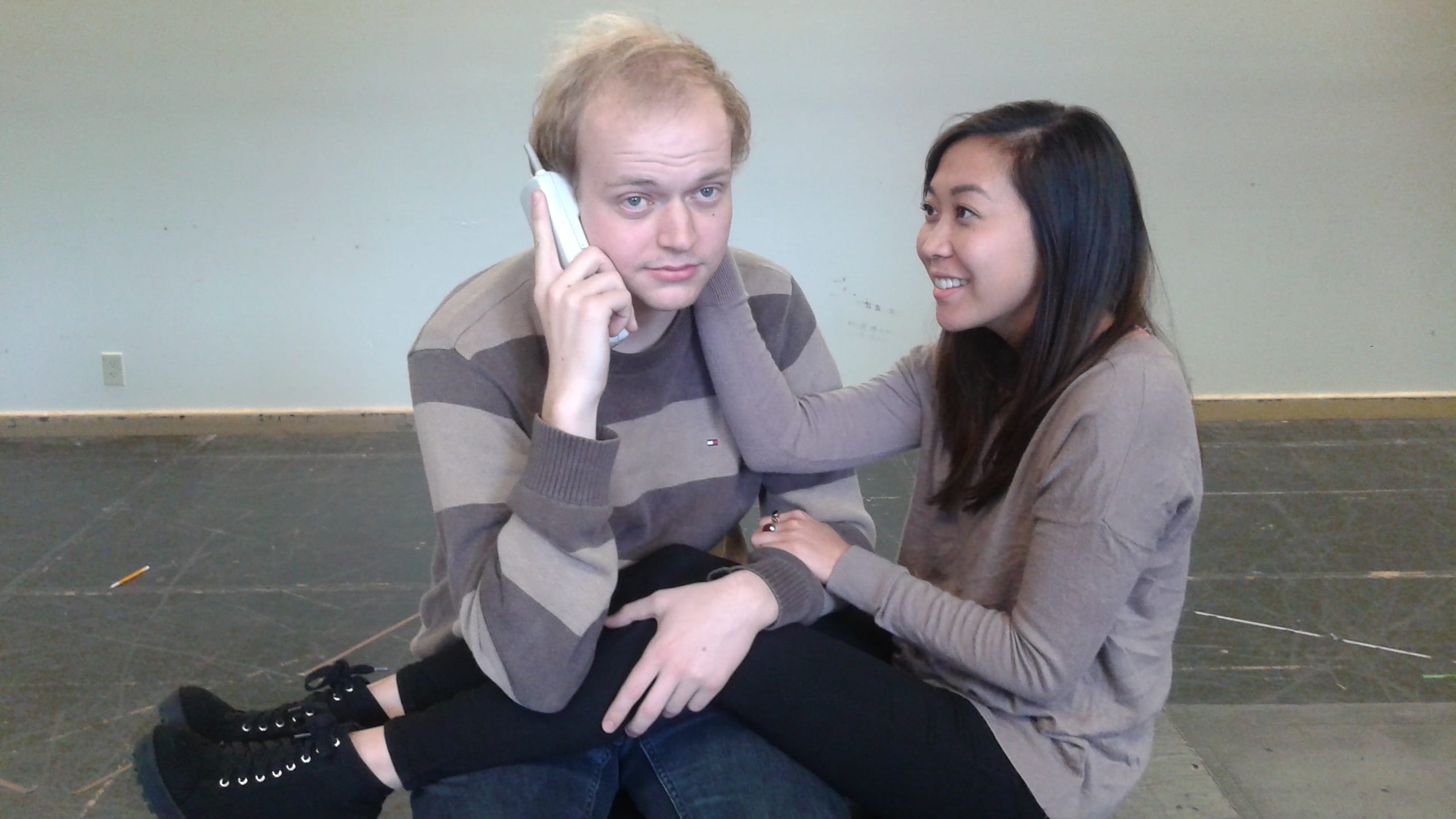SALT LAKE CITY — The struggle with identity is one most people face at some point in their lifetime. Throw in race, ethnicity, and the media, and the struggle becomes even more complicated. These are the polarizing themes in People Productions’s Yellow Face. This semi-autobiographical story of playwright David Henry Hwang (played by Michael Havey) follows his journey as an activist and “poster child of political correctness” for Asian Americans after the controversial decision to cast a white, British man in an Asian role during the production of Miss Saigon in London in 1989. David then, unknowingly, does the same, casting Marcus Gee (played by Cody Thompson), a white man, in an Asian role for his new play. When David realizes Marcus isn’t Asian, he attempts damage control, trying to pass Marcus off as having Siberian Jewish heritage. Meanwhile, Marcus runs with his newfound false identity, becoming a voice, or “ethnic tourist,” for Asian Americans—angering and frustrating David that Marcus would use his fame in such an appalling way.

A parallel storyline follows the relationship between David and his father, Henry (Jefferson Itami). It is one in which most adult children and parents can relate—exasperating, yet unconditionally loving. David and Henry, along with other Chinese Americans, come under investigation by the government for allegedly filtering money from China to influence U.S. politics. It’s through this ordeal, and an interview with a newspaper reporter, that David finally understands the importance of identity and telling it the best way he knows how—through a play.
Director Kerry Lee follows David Henry Hwang’s lead by focusing on the identity of the characters. Using a minimalist set of black boxes—even keeping the actors on the sides of the stage in chairs during the action—brings their individuality to light. In the same vein, the lighting design by Glenn Linder is used to decent effect, although there were a few moments (such as when David enters the stage from the audience or when Itami steps out of the light) where it would have been nice to see their faces. Similarly, Lee’s setting and costume conception go unnoticed, artfully allowing the audience to focus on the characters and their motives rather than their props and costumes. One notable exception, though, occurs when David and Marcus wear similar clothing; this seems to reflect David’s belief that Marcus is trying to become him.
At first, the decision to break the fourth wall is distracting. This is especially true when Itami and others are talking on the phone and hold it away from their head instead of pressed up against their ear. Throughout the course of the play, however, this directorial choice becomes a useful tactic to separate the facts of the story—told through newspaper articles and television reports—from David’s own scenes.
Havey’s interactions with Itami and Thompson are particularly strong. In one of the most humorous scenes, Henry, on the phone with David, begins telling a story David has heard a hundred times, mouthing all the words to the story silently. Although, halfway through the second act when the pair begins discussing the investigation into Henry’s bank, Far East National, the conversation between father and son does slow down the action. Because only Havey plays a single role (as David), only his character develops a true character arc. This is concerning at first, but in the end, it doesn’t matter. Yellow Face is David’s story to tell. And, with so many aspects of his life developing over the course of the play, it makes sense that his journey is the only one that truly materializes.
With the rest of the actors playing multiple roles, it is imperative the audience knows who they are from scene to scene. Luckily, they tell us. Whether it’s McKenna Jensen’s transition from Jane Krakowski to Senator Fred Thompson, or Wendy Dang playing BD Wong and then Judge James Parker, I knew who they were. Because of this, it was fun to watch these actors portray different characters. This is especially the case for Jensen and Lily Hye Soo Dixon, who seamlessly move from one identity to the next. Emphasizing the play’s central theme of ethnicity, it is refreshing to see Jensen, a black woman, hilariously characterizing Jane Krakowski, and Dixon interpreting a wide range of people and races.
Itami is strongest playing opposite Havey as Henry. When Itami steps into the other roles, such as Margaret Cho or Utah Senator Bob Bennett, it was difficult to understand what he’s saying. Likewise, Adam Tyler is noteworthy as a reporter (called only Name Withheld on Advice of Counsel) trying to persuade David to give up information about his father, as it is central to the character’s identity. Unfortunately, Tyler’s appearances as Cameron Mackintosh or Dick Cavett are less memorable because the roles are so brief. Thompson is in a similar position with Marcus Gee as his main focus. Although he also plays Senator John Kerry and Frank Rich, Thompson is at his best when concentrating on Marcus Gee, specifically as the catalyst in the last scene between Marcus and David.
This production of Yellow Face is intriguing and thought provoking, eliciting the question of, “Where are any of us really from?” And, it’s a fascinating look into the mind of a playwright coming to the realization that not everything in life is black and white.
[box type=”shadow”]Yellow Face, produced by People Productions, plays at the Sugar Space Arts Warehouse Theatre (132 South 800 West, Salt Lake City) Fridays and Saturdays at 7:30 PM and Sundays at 3 PM through June 14. Tickets are $10-15. For more information, visit peopleproductions.org.[/box]
